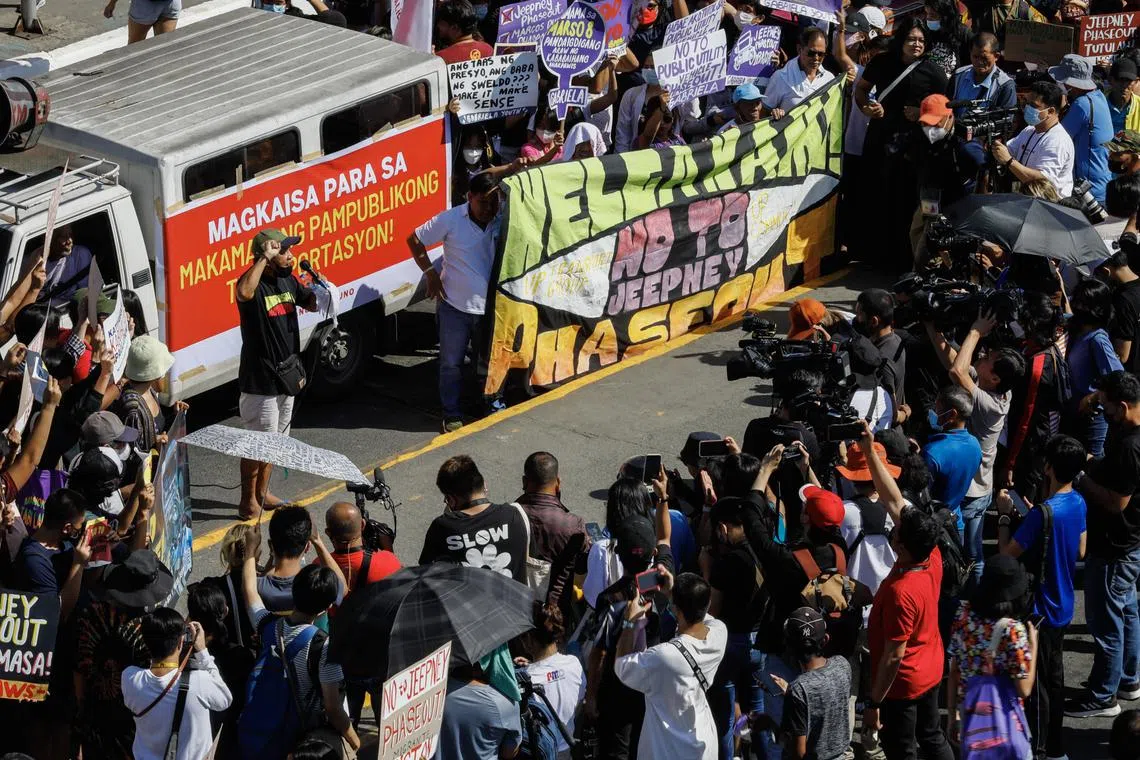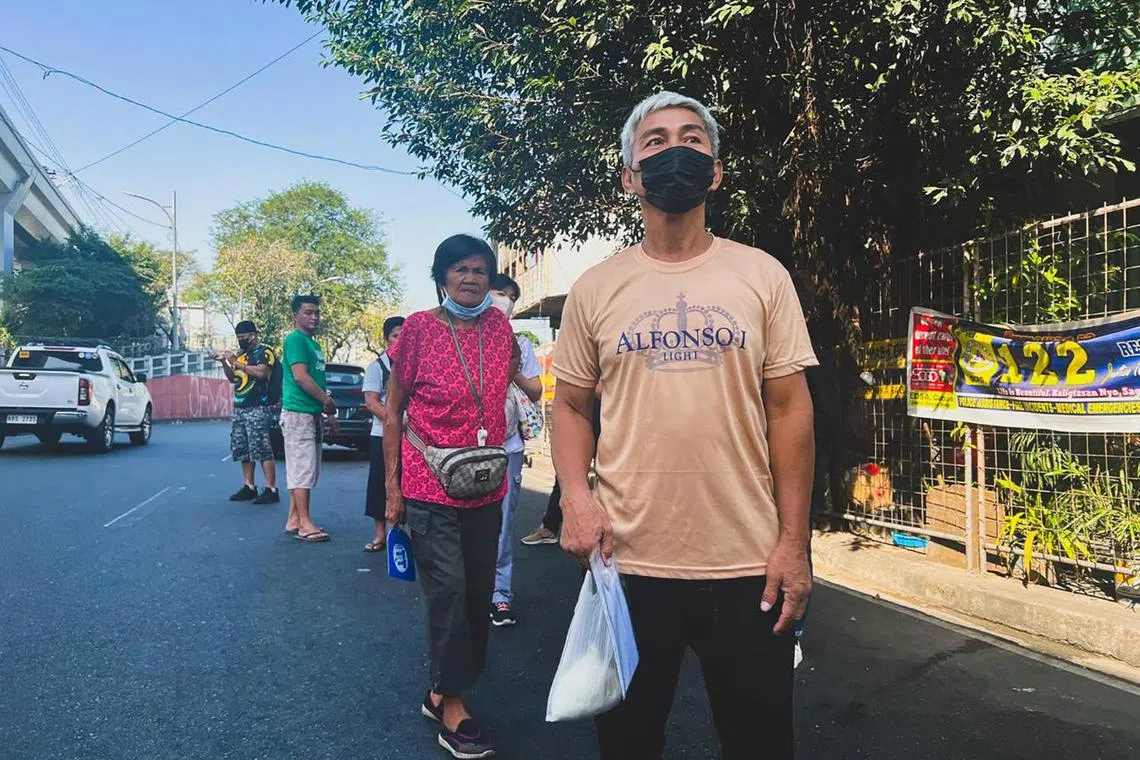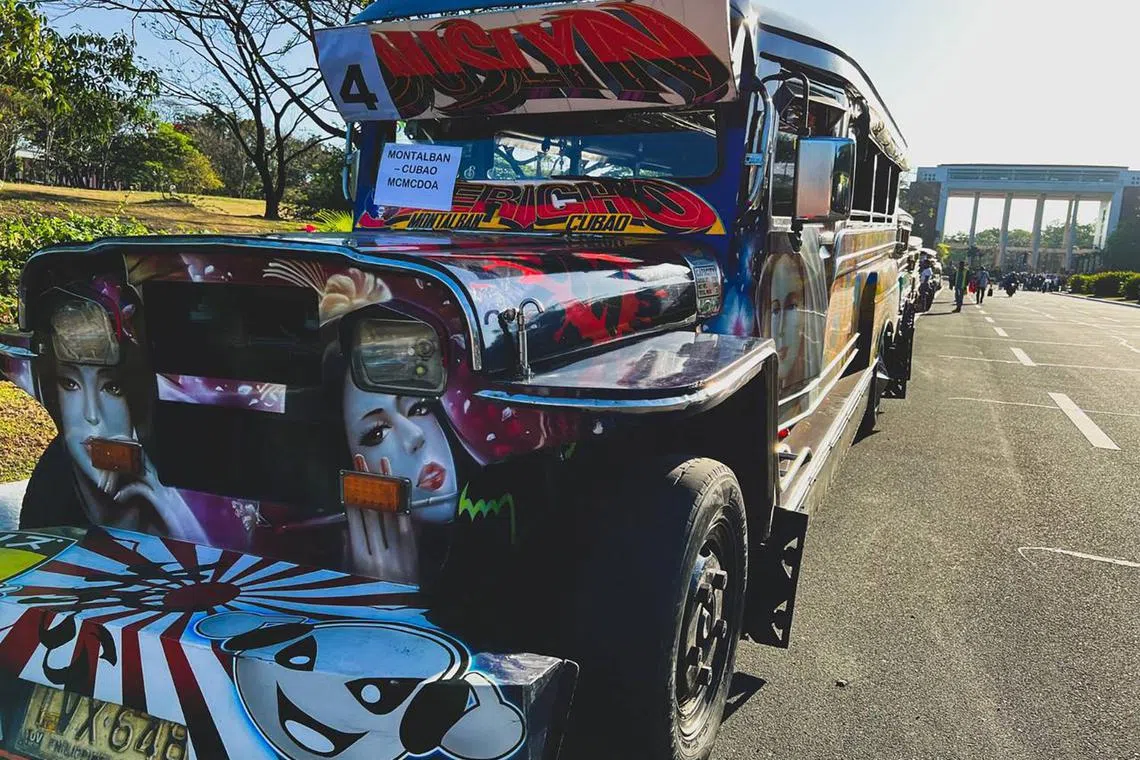Philippine jeepney strike begins as free rides, remote work spare commuters
Sign up now: Get insights on Asia's fast-moving developments

Transport union members hold a rally as part of a transport strike along a main thoroughfare in Quezon City, Metro Manila, on March 6.
PHOTO: EPA-EFE
MANILA - A seven-day jeepney strike across the Philippines minibuses in favour of modernised vehicles.
In the capital Manila and surrounding cities, some 40,000 jeepney drivers refused to ply their routes on the first day of the strike, according to Mr Mar Valbuena, chairman of transport group Manibela.
But the strike was barely felt on the streets during the morning rush hour, as several schools and offices shifted classes and operations online in anticipation of the protest.
The government offered free rides across cities and provinces, while some jeepney drivers still accepted passengers as they refused to lose a day’s worth of earnings.
Still, some commuters like truck driver Jaime Maramag, 56, had to wait for more than 30 minutes at an intersection in Quezon City to ride a jeepney to his office about 8km away. It was his cheapest option, at 12 pesos (29 Singapore cents), as a motorised tricycle ride costs twice as much.
“It is so hard to find a ride today, but I agree with the strike. The government should not get rid of jeepneys because the replacements are too expensive,” he said.
Other commuters shared tricycles to reach their destination, while some booked rides using car- and motorcycle-hailing apps instead.
Launched in 2017, the government’s modernisation programme seeks to replace traditional jeepneys aged 15 years or older with imported vehicles powered by Euro-4 diesel engines or electric motors that have less carbon emissions.
Drivers and operators are required to consolidate into one cooperative or corporation, which will be allowed to run a fleet of at least 15 modernised jeepneys. Otherwise, they lose their franchise to operate.
The government said this will help address the perennial transportation problem in the Philippines, plagued by traffic jams and smoke-belching, overcrowded public minibuses.
The consolidation deadline has been repeatedly pushed back since March 2020 due to Covid-19 and strong opposition from transport groups, which complain about the hefty costs of the modernisation plan.
The deadline was initially set for June 30, 2023, but the government has moved it to Dec 31 after the jeepney strike was announced last week.
Dubbed the “Kings of the Road”, the jeepneys’ kitsch decorations are as loud as the roar of their ageing engines.
Repurposed from abandoned American military jeeps during World War II, the jeepney is considered a cultural symbol of Filipino creativity and ingenuity.

Commuter Jaime Maramag waits for a jeepney during the transport strike in Quezon City, Philippines on March 6, 2023.
ST PHOTO: MARA CEPEDA
But they have also become notorious due to crowded seating, lack of seatbelts and undisciplined drivers who violate road rules.
Jeepneys are also a major source of air pollution. A 2018 study by the National Centre for Transportation Studies showed that they account for half of airborne particulate matter in Manila and surrounding cities.
The modernisation programme has been slow-moving so far.
The Department of Transportation said that as at Monday, only 6,900 of the country’s 180,000 registered jeepneys have been replaced with the modernised vehicles.
Still, about 112,500 jeepneys have already formed cooperatives.
Drivers and operators on strike worry about their soaring debt due to the modernisation programme. A traditional jeepney costs about 150,000 to 250,000 pesos, while modernising them would set them back by up to two million pesos per vehicle.
It is a huge sum, especially for jeepney drivers who earn roughly 4,000 pesos a day. Their take-home pay is only a quarter of that because gross earnings are shared with the jeepney operator and used to pay for fuel.
“Only the cooperatives will gain from this, not us,” 42-year-old jeepney driver Reynante Ilagan said. “We are barely earning enough to feed our kids. The phase-out will bury us in debt.”
Mr Valbuena said protesters reject big corporations’ potential to monopolise the industry.
In 2022, Filipino business tycoon Manny Pangilinan invested 1.5 billion pesos to fund operations of about 500 modern jeepneys in his fleet by 2027.

A jeepney at the Philippines’ premiere state university in Quezon City, where drivers were protesting on March 6, 2023.
ST PHOTO: MARA CEPEDA
As more of their colleagues give in to the modernisation programme, Mr Valbuena is saddened by the thought that Filipinos will no longer ride the traditional jeepney one day.
“The modernisation is going to be a heavy blow to our culture,” he said. “Many of us in the transport sector fell in love with the jeepney, but it is slowly being wiped out”.



